ECOSOC at 80: Renewing Multilateralism in an Age of Global Uncertainty
On 23 January, the United Nations Economic and Social Council (ECOSOC) convened a commemorative session…
The 43rd plenary session of the UN Committee of World Food Security took place October 17 to 21, 2016 to discuss the issues and solutions on global food security and nutrition. This year’s session saw 56 side-events. The Private Sector Mechanism hosted 4 and a book launch, all discussing various issues and topics to advance the private sector’s engagement in reducing food insecurity, and achieving the sustainable development goals. These side-events included:
Adopting African orphan crops to enhance food security, nutrition and safety
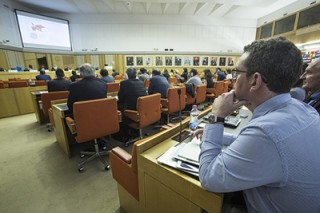 This side event discussed thepartnership between 15 government organizations, scientific, agricultural bodies, universities, companies, regional organizations and NGOs along with a network of 20 agricultural and horticultural organizations, devoted to improving the diets and livelihoods of the 600 million people who live in rural Sub-Saharan Africa. Together, they believe that they must generate resources to improve African orphan crops for improved nutrition throughout the continent.
This side event discussed thepartnership between 15 government organizations, scientific, agricultural bodies, universities, companies, regional organizations and NGOs along with a network of 20 agricultural and horticultural organizations, devoted to improving the diets and livelihoods of the 600 million people who live in rural Sub-Saharan Africa. Together, they believe that they must generate resources to improve African orphan crops for improved nutrition throughout the continent.
Approved by African Heads of State at the African Union Assembly and led by the New Partnership for Africa’s Development (NEPAD), the African Orphan Crops Consortium is sequencing the genomes of 101 African food plants. The consortium’s African Plant Breeders Academy in Nairobi, Kenya will train 250 African scientists and technicians to sequence and breed the plants to be more nutritious, productive and resilient in the face of climate change.
Learn more about what the speakers discussed here.
Urban Food Security in an Urbanising World: Lessons from Singapore
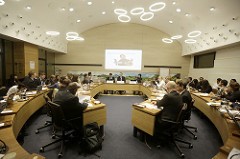 Singapore is a key role model for jump starting urban food security, being ranked as the world’s second most food secure country after the United States by the Global Food Security Index in 2015, despite not having any significant primary food production resources in the country. This side event kick-started the discussions around food security in an urban environment – subject of a CFS special session and workstream – where fast growing cities and demographics present a different set of challenges.
Singapore is a key role model for jump starting urban food security, being ranked as the world’s second most food secure country after the United States by the Global Food Security Index in 2015, despite not having any significant primary food production resources in the country. This side event kick-started the discussions around food security in an urban environment – subject of a CFS special session and workstream – where fast growing cities and demographics present a different set of challenges.
Learn more about the key themes discussed by the participants from the side even recap here.
Ideas Showcase: Investments to Advance the SDGs
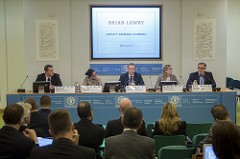 Achieving SDG2 will require significant investments to develop the entire value chain in the sector: from improving yields and collection operations on farms to the transportation of products and their distribution on local, regional or international markets; integrating smallholders more effectively in markets; empowering women; providing economic opportunities in rural areas and addressing the likely impacts of climate change. This side event worked as a discussion panel to promote collaboration between the public and private sector. After hearing from 10 panelists, attendees were given the opportunity to network with each speaker to encourage future collaborations.
Achieving SDG2 will require significant investments to develop the entire value chain in the sector: from improving yields and collection operations on farms to the transportation of products and their distribution on local, regional or international markets; integrating smallholders more effectively in markets; empowering women; providing economic opportunities in rural areas and addressing the likely impacts of climate change. This side event worked as a discussion panel to promote collaboration between the public and private sector. After hearing from 10 panelists, attendees were given the opportunity to network with each speaker to encourage future collaborations.
Learn about the panelists views on how to achieve the SDGs here.
Sustainable Dairy Goals: Achieving the Sustainable Development goals — the Role of the Dairy Sector
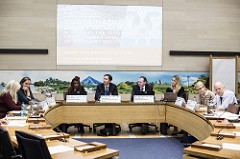 This side-event showcased concrete examples of projects in the dairy sector that have addressed multiple challenges through social, organizational and technological innovations at the nexus between the SDGs, climate change and ICN2 objectives. Dairy has the potential to reinvigorate rural economies, providing sustainable livelihoods for smallholder farmers and a resilient source of economic growth.
This side-event showcased concrete examples of projects in the dairy sector that have addressed multiple challenges through social, organizational and technological innovations at the nexus between the SDGs, climate change and ICN2 objectives. Dairy has the potential to reinvigorate rural economies, providing sustainable livelihoods for smallholder farmers and a resilient source of economic growth.
Learn about how dairy can make a significant contribution towards food and nutrition security here.
Book Launch: “Good Nutrition: Perspectives for the 21st Century” — Food for thought and a call to act
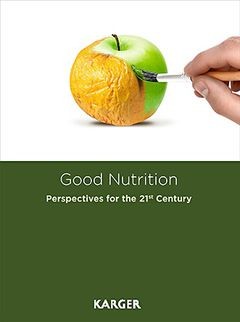 The Side Event presented the book “Good Nutrition: Perspectives for the 21st Century”, followed by a panel discussion, dedicated to the important topics assessed in the book. The event encouraged a dialogue between CFS stakeholders – specifically governments, UN agencies, civil society and private sector – dedicated to work related to food security and nutrition at global, national and regional levels.
The Side Event presented the book “Good Nutrition: Perspectives for the 21st Century”, followed by a panel discussion, dedicated to the important topics assessed in the book. The event encouraged a dialogue between CFS stakeholders – specifically governments, UN agencies, civil society and private sector – dedicated to work related to food security and nutrition at global, national and regional levels.
Read about the discussion panel, and input from those dedicated to working in nutrition, here.